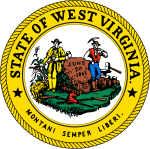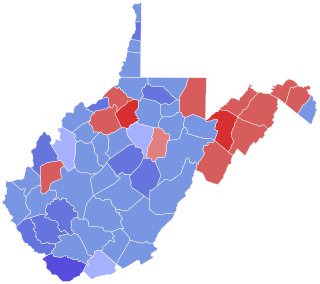| |||||||||||||||||
| |||||||||||||||||
 County results Byrd: 50–60% 60–70% 70–80% Wolfe: 50–60% | |||||||||||||||||
| |||||||||||||||||
| Elections in West Virginia |
|---|
 |
The 1988 United States Senate election in West Virginia took place on November 8, 1988. Incumbent Democratic U.S. Senator Robert Byrd won re-election to a sixth term.
| |||||||||||||||||
| |||||||||||||||||
 County results Byrd: 50–60% 60–70% 70–80% Wolfe: 50–60% | |||||||||||||||||
| |||||||||||||||||
| Elections in West Virginia |
|---|
 |
The 1988 United States Senate election in West Virginia took place on November 8, 1988. Incumbent Democratic U.S. Senator Robert Byrd won re-election to a sixth term.
| Party | Candidate | Votes | % | |
|---|---|---|---|---|
| Democratic | Robert Byrd (incumbent) | 410,983 | 64.77% | |
| Republican | Jay Wolfe | 223,564 | 35.23% | |
| Democratic hold | ||||

The 1982 United States Senate elections were held on November 2, 1982. They were elections for the United States Senate following Republican gains in 1980. The 33 Senate seats of Class 1 were up for election in 1982. A total of four seats changed hands between parties, with Democrats winning seats in New Jersey and New Mexico, and Republicans taking seats in Nevada and the seat of the lone independent, Senator Harry Byrd Jr., in Virginia. Democrats made a net gain of one seat bringing them to 46 seats, while Republicans stayed at 54 seats for a majority. However, the Democratic gain in New Jersey replaced a Republican that had been appointed earlier in the year.

The 1976 United States Senate elections was an election for the United States Senate. Held on November 2, the 33 seats of Class 1 were contested in regular elections. They coincided with Democrat Jimmy Carter's presidential election and the United States Bicentennial celebration. Although almost half of the seats decided in this election changed parties, Carter's narrow victory did not provide coattails for the Democratic Party. Each party flipped seven Senate seats, although, one of the seats flipped by Democrats was previously held by a Conservative.

The 1970 United States Senate elections was an election for the United States Senate. It took place on November 3, with the 33 seats of Class 1 contested in regular elections. Special elections were also held to fill vacancies. These races occurred in the middle of Richard Nixon's first term as president. The Democrats lost a net of three seats, while the Republicans and the Conservative Party of New York picked up one net seat each, and former Democrat Harry F. Byrd Jr. was re-elected as an independent.

The 1964 United States Senate elections were held on November 3. The 33 seats of Class 1 were contested in regular elections. Special elections were also held to fill vacancies. They coincided with the election of President Lyndon B. Johnson by an overwhelming majority, to a full term. His Democratic Party picked up a net two seats from the Republicans. As of 2023, this was the last time either party has had a two-thirds majority in the Senate, which allowed the Senate Democrats to override a veto, propose constitutional amendments, or convict and expel certain officials without any votes from Senate Republicans. However, internal divisions would have prevented the Democrats from having done so. The Senate election cycle coincided with Democratic gains in the House in the same year.

The 1958 United States Senate elections were elections for the United States Senate which occurred in the middle of President Dwight D. Eisenhower's second term. Thirty-two seats of Class 1 were contested in regular elections, the new state of Alaska held its first Senate elections for its Class 2 and 3 seats, and two special elections were held to fill vacancies.

The 2006 United States Senate election in West Virginia was held November 7, 2006. Incumbent Democrat Robert Byrd won re-election to a ninth term. He was sworn in on January 3, 2007. However, he died in office on June 28, 2010, before the end of his term. This was Byrd's closest re-election.

The 2000 United States Senate election in West Virginia took place on November 7, 2000. Incumbent Democratic U.S. Senator Robert Byrd won re-election to an eighth term. He won every county and congressional district in the state with at least 60% of the vote. This was despite the fact that Republican presidential candidate George W. Bush won the state for President on the same ballot.

The 1848–49 United States Senate elections were held on various dates in various states. As these U.S. Senate elections were prior to the ratification of the Seventeenth Amendment in 1913, senators were chosen by state legislatures. Senators were elected over a wide range of time throughout 1848 and 1849, and a seat may have been filled months late or remained vacant due to legislative deadlock. In these elections, terms were up for the senators in Class 3.

The 1892–93 United States Senate elections were held on various dates in various states, coinciding with former Democratic President Grover Cleveland's return to power. As these U.S. Senate elections were prior to the ratification of the Seventeenth Amendment in 1913, senators were chosen by state legislatures. Senators were elected over a wide range of time throughout 1892 and 1893, and a seat may have been filled months late or remained vacant due to legislative deadlock. In these elections, terms were up for the senators in Class 1.

The 1866–67 United States Senate elections were held on various dates in various states. As these U.S. Senate elections were prior to the ratification of the Seventeenth Amendment in 1913, senators were chosen by state legislatures. Senators were elected over a wide range of time throughout 1866 and 1867, and a seat may have been filled months late or remained vacant due to legislative deadlock. In these elections, terms were up for the senators in Class 3.

The 1864–65 United States Senate elections were held on various dates in various states. They occurred during the American Civil War and Abraham Lincoln's re-election. As these U.S. Senate elections were prior to the ratification of the Seventeenth Amendment in 1913, senators were chosen by state legislatures. Senators were elected over a wide range of time throughout 1864 and 1865, and a seat may have been filled months late or remained vacant due to legislative deadlock. In these elections, terms were up for the senators in Class 2.

The 1994 United States Senate election in West Virginia was held November 7, 1994. Incumbent Democratic U.S. Senator Robert Byrd won re-election to a seventh term. He won every county and congressional district in the state.

The 1982 United States Senate election in West Virginia took place on November 7, 1982. Incumbent Democratic U.S. Senator Robert Byrd won re-election to a fifth term.

The 1976 United States Senate election in West Virginia was held on November 2, 1976. Incumbent Democratic U.S. Senator Robert Byrd won re-election to a fourth term. The Republican Party did not field a candidate for this election, leading to a 100% election victory for Robert Byrd. Byrd's 566,359 votes is the most received by a Democrat in any statewide election in the state's history.

The 2010 United States Senate special election in West Virginia was held on November 2, 2010. Incumbent Democratic Senator Robert Byrd died in office on June 28, 2010. Democratic Governor Joe Manchin appointed Carte Goodwin to temporarily fill the vacancy. Goodwin pledged to not run for election to the seat in exchange for the appointment. This was the first open U.S. Senate seat in West Virginia since 1984 and the first in this seat since 1956. Manchin won the open seat and served out the remainder of Byrd's elected term, which ended on January 3, 2013.

The 1970 United States Senate election in Virginia was held on November 3, 1970. Incumbent Senator Harry F. Byrd Jr. was re-elected to his first full term after winning a race 4 years earlier to finish the remainder of his father's term.

The 1966 United States Senate special election in Virginia was held on November 8, 1966, alongside the other U.S. Senate election in Virginia. Incumbent Senator Harry F. Byrd Sr. had retired the previous year for health reasons, and his son Harry F. Byrd Jr. had been appointed to replace him. Byrd defeated Republican Lawrence M. Traylor and independent candidate John W. Carter, and was able to finish the balance of his father's sixth term.

The 1958 United States Senate election in West Virginia was held on November 4, 1958.

The 1964 United States Senate election in West Virginia was held on November 3, 1964 alongside the 1964 United States presidential election. Incumbent Senator Robert Byrd won re-election in a landslide.

The 1970 United States Senate election in West Virginia was held on November 3, 1970. Incumbent senator Robert Byrd won re-election by the biggest margin at that point in his career.